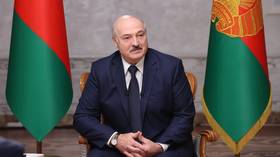Liberals & hawks accuse Trump of ‘attack’ on military after he says Pentagon chiefs ‘fight wars to keep arms dealers healthy'
8 Sep, 2020

FILE PHOTOS. © Reuters / Brendan McDermid; Reuters / Sarah Silbiger
Follow RT
US President Donald Trump accused the Pentagon’s top brass of starting wars in order to hand billions to arms makers, drawing shocked reactions from his liberal critics and foreign policy hawks – some playing both roles at once.
“I'm not saying the military's in love with me – the soldiers are,” the president said at a White House press conference on Monday.
The top people in the Pentagon probably aren't because they want to do nothing but fight wars so that all of those wonderful companies that make the bombs and make the planes and make everything else stay healthy.
Trump: "I'm not saying the military's in love with me. The soldiers are. The top people in the Pentagon probably aren't because they want to do nothing but fight wars, so all of those wonderful companies that make the bombs and make the planes and make everything else stay happy" pic.twitter.com/uu1UnBnHbT— CBS News (@CBSNews) September 7, 2020
Trump’s comments come as his latest response to a September 3 story in the Atlantic, which alleged the president had denigrated fallen American soldiers throughout his time in office, reportedly dubbing them “losers” and “suckers.” Trump has repeatedly denied the allegations, which were based on the claims of anonymous officials and aides, reiterating on Monday: “Who would say a thing like that? Only an animal would say a thing like that.”
His scathing critique of the Pentagon’s top leadership prompted a new wave of controversy, however, as a number of media pundits, Democratic lawmakers and bellicose foreign policy commentators lined up to voice horror at the “unprecedented public attack” on the military.
“Perhaps [Defense Secretary Mark Esper] should defend the honor of those with whom he serves at the Pentagon? He has little to lose, since he's probably going to be fired anyway. Why not go out on a high note?”tweeted neoconservative luminary Bill Kristol, a top booster of the disastrous US invasion of Iraq and a vocal #NeverTrumper.
Dear @realDonaldTrump: You have attacked servicemembers who died in war; Gold Star families; POWs; and now military leadership. WHAT IS WRONG WITH YOU?You are the Commander in Chief. Please stop denigrating our military.Also when will you condemn Putin?#TrumpPressConferencehttps://t.co/wSnjuCCJ5n— Ted Lieu (@tedlieu) September 7, 2020
Everyone is entitled to their opinion about the US military. But this comes during 9-11 commemoration here at Pentagon & military bases around the world. Generals have held dying troops in their arms, buried them at Arlington and 19 years later still comfort families. https://t.co/8W6vom3gsF— Barbara Starr (@barbarastarrcnn) September 7, 2020
Wait, so after insisting he'd never insult military veterans, Trump goes on live television and accuses military leaders of being warmongers?— Josh Campbell (@joshscampbell) September 7, 2020
The president’s son, Donald Trump Jr., also weighed into the fray, arguing that a “permanent moratorium” on retired generals serving on the boards of defense contractors – a phenomenon known as the ‘revolving door’ – would “end the endless wars immediately.” He pointed to a series of former officials who left their posts in the Pentagon for cushy jobs in the weapons industry, where retired officers often work as lobbyists helping to grease the skids for lucrative government contracts.
If you want to end the endless wars immediately put a permanent moratorium on retired General’s serving on the boards of defense contractors. We would be out of Afghanistan by Wednesday. https://t.co/99QkLgZ7Uj— Donald Trump Jr. (@DonaldJTrumpJr) September 7, 2020
Between 2008 and 2018, at least 380 high-ranking Pentagon officials were hired by top defense contractors after leaving public office, including 25 generals, 9 admirals, 43 lieutenant generals and 23 vice admirals, according to a report by the Project On Government Oversight (POGO). Many became lobbyists, board members, executives or consultants for firms such as Lockheed Martin, General Dynamics, Raytheon and Northrop Grumman.
What's next, calling out military brass for retiring to plum positions on military industrial company boards and then appearing on cable news to drum up support for war without disclosing their conflicts of interest? No, sir! I won't hear of it!!!!— Eoin Higgins (@EoinHiggins_) September 7, 2020
Some netizens, as well as progressive lawmaker Ro Khanna (D-California), took up a wholly different criticism of the president, arguing that while Trump is correct about the Pentagon, he himself has been “complicit” in expanding US military budgets and feeding billions to arms dealers.
“This is correct but Trump has increased the military budget and the amount of bombs we drop, which means larger profits for defense contractors. So he’s right but he is also complicit,” one user wrote.
I know you do not believe facts matter. But if you are really opposed to companies that make bombs and planes making money, why have you proposed over $140 billion MORE in defense spending than Obama, including a slush fund for endless wars. https://t.co/W18IN0WGFM— Ro Khanna (@RoKhanna) September 7, 2020
"President Trump has accused US military leaders of seeking to start wars to boost the profits of defense contractors"Aren't there historical facts to back this up?Ever heard of the USS Maine?Or the Gulf of Tonkin?How about 'weapons of mass destruction in Iraq.' pic.twitter.com/FVgVmDhPrT— Cognitive Dissident-I Believe 6% of What CDC Says (@farmingganja) September 7, 2020
People are so focused on saying he’s wrong that they don’t realize the real issue - he’s right, but he’s made the problem WORSE. He’s given them MORE money. Only Trump could get away with calling out a problem that he’s contributing to— Abolish the DSCC (@bluefacebabyyy_) September 7, 2020
Despite his withering attack on the Pentagon’s revolving door, Trump has frequently boasted of “rebuilding” the US armed forces with vast military expenditures, which continue to outspend the world’s next 11 largest defense budgets combined. He has also repeatedly touted multi-billion dollar weapons sales to Saudi Arabia and other allies, insisting they support American jobs and bring money into the country.
15 Feb, 2020
FILE PHOTO: US Navy sailors move aircraft from an elevator into the hangar bay of the aircraft carrier USS Theodore Roosevelt in the South China Sea. © Reuters / Mass Communication Specialist Seaman Michael Hogan / US Navy Handou
Follow RT on

Military spending among 170 countries jumped by 4 percent in 2019 compared to the prior year, sending the total to its highest level in a decade, according to an annual assessment released on Friday by the International Institute for Strategic Studies (IISS).
Global defence spending has reached its highest level in a decade, IISS #MilitaryBalance data published today shows. Find out more in The Military Balance 2020 – OUT NOW | https://t.co/4sQPYYuTVVpic.twitter.com/OL2ZPfvRIn— IISS News (@IISS_org) February 14, 2020
While the new report attributes the soaring pay-outs to an “unstable international security environment,” Washington’s massive $53.4 billion “defense” hike – roughly equal to the UK’s entire military budget – played an outsized role in driving the numbers to their current 10-year record high.ALSO ON RT.COM‘Too much money invested in war’: US defense industry drives global military spending spree
China placed second on the list, spending around $181 billion last year as Beijing continues to modernize and expand its armed forces. Compared to 2018, both Washington and Beijing’s military budgets grew by some 6.6 percent, but while growth was similar between the two countries, the trends are “diverging” and the US is widening the gap, according to IISS research fellow Lucie Béraud-Sudreau.
“The budget increase in the US was the largest in 10 years, and spending has increased year-on-year since US President Donald Trump took office,” Béraud-Sudreau wrote in a blog post. “While spending is still rising in China, the pace of growth is decelerating.”
‘Nominal increase in US defence spending of US$53.4bn between 2018 and 2019 almost matched the UK’s entire 2019 defence budget of US$54.8bn, and is equivalent to the 7th-largest defence budget in the world’ | @chipmanj#MilitaryBalance#MSC2020https://t.co/4DNxTV6Y2mpic.twitter.com/1653bVxxbG— IISS News (@IISS_org) February 14, 2020
With total US military expenditures hitting nearly $685 billion in 2019, Washington continues to out-spend 11 countries combined – China, Saudi Arabia, Russia, India, the UK, France, Japan, Germany, South Korea, Brazil, and Italy. Though euphemistically termed “defense spending,” much of the US outlays finance a vast network of overseas bases and foreign troop deployments, some of them – such as in Iraq and Afghanistan – ongoing for the better part of two decades.
Military budgets in Europe have seen marked increases as Washington demanded its NATO partners contribute more to their own defense. However, US allies “still have some way to go before they would be able to act effectively without US military assistance,” the report notes, as it is unclear that the spending increases in 2019 “will significantly improve military capabilities in the near term.”
‘Too much money invested in war’: US defense industry drives global military spending spree
30 Apr, 2019
FILE PHOTO. © Reuters / US Navy /Mass Communication Specialist 2nd Class Z.A. Lan
The world spent $1.8 trillion on its military in 2018, the latest report by the acclaimed Stockholm International Peace Research Institute (SIPRI). The US and its NATO allies – the self-proclaimed defenders of freedom and democracy – account for more than half of this whopping amount.
Washington’s other close friend Saudi Arabia is the third largest military spender, coming ahead of India.
READ MORE
“A lot of this spending, particularly in the case of Saudi Arabia and India, is for political reasons,” Michael Maloof, a former senior security policy analyst at the Pentagon, told RT. New Delhi and Riyadh seek to “curry favor” with Washington by purchasing the US weapons in hope for concessions in other areas, he explained.
Washington’s NATO allies have seen pressure from the US related to their military spending ever since Donald Trump came to power in the White House. Maloof believes it has less to do with security of the alliance and more with the interests of the US arms manufacturers.
“A lot of that is aimed at trying to help the US defense industry to stay ahead [of their competitors] and hire more people,” he explained, adding that the issue of the military expenditures has a “clear economic dimension.”
In its desire to sate the always-hungry domestic military industrial complex, the US risks escalating tensions on the international arena, analysts warn. Washington’s hawks typically justify the need for ever-increasing military expenditures with some perceived threats from Russia or China, portraying them as war mongers.
“There is no good reason” for larger defense budgets, Ted Seay, a former US diplomat and senior policy consultant with the British American Security Information Council (BASIC), told RT. It is the West’s fear of the perceived ‘Russian threat’ that has in fact led to destabilization on the European continent, he noted.
“There are military provocations taking place between NATO and Russia where there should not be any far in the 21th century when there is no logical reason for any confrontation between Europe and Russia,” Seay said.
The former US diplomat also denounced as senseless the NATO “formula” demanding that member states spend two percent of their GDP on defense.
There is not a military situation that necessitates [the likes of] Latvia or Poland to find a solution in greater military spending. It simply does not exist in this age. But there are people who seem to be intent on creating confrontation and encouraging the NATO countries to spend more money with no good reason.
Yet, it is precisely Poland and the Baltic States that top the list of nations with the highest annual defense spending increases in Europe over the recent years.
Poland’s military budget rose by 8.9 per cent in 2018 to $11.6 billion, according to SIPRI, while Latvia upped its military expenditures by staggering 24 percent over the same period. Bulgaria and Ukraine – which is not in NATO – followed closely, increasing their spending by 23 and 21 percent respectively.
Meanwhile, the US and its allies grossly outspend all the nations they perceive as alleged threats. The US expenditures alone accounted for 36 percent of global defense spending while exceeding the expenditures of the next eight largest-spending countries combined in 2018. NATO’s total military spending accounted for 53 percent of the global defense expenditures.ALSO ON RT.COM











